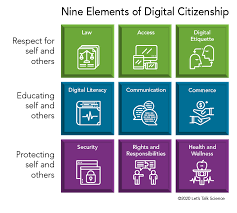In today’s digital world, people of all ages are spending an ever-increasing amount of time online—at home, in the workplace, and (especially important for us) at school. Technology in schools has boomed, allowing teaching and learning to take place beyond the confines of school buildings and the walls of our classrooms. Twenty-first century classrooms are connected to the digital world via personal desktop computers, Chrome Books, the Smart Board, and personal handheld devices. Teachers and students are no longer limited to physical resources, such as textbooks, encyclopedias, and DVD/VHS media. Rather, we have access to a limitless array of digital resources and content—easily and effortlessly retrieved with one swift click.
With this ease and swiftness, however, comes great responsibility and risk. Not everything online is safe, secure, or appropriate for educational (or other) use. Teachers must ensure that they access and utilize content that aligns with the curriculum and is vetted and approved by their employer and union (i.e. School District, Ministry of Education, BCTC, BCTF, etc.) Teachers must also ensure that they use resources and content with permission, paying attention to Copyright laws as they pertain to educational purposes (i.e. Copyright, Fair Dealing, and the Classroom).
Teachers, alongside parents and guardians, are responsible for ensuring students become responsible, well-educated citizens: “In the real world, the development of citizenship skills and knowledge does not happen on its own. These are taught through both the authorized curriculum and the norms and expectations established in our cultures” (Let’s Talk Science, 2020). In our current digital world, teachers are also responsible for role-modelling, guiding, and educating students on what it means to be a good digital citizen: “When it comes to digital citizenship, educators and other adults must lead by example. They must make the effort to incorporate digital citizenship into learning plans. […] Because so much of their communication and learning happens online, students must be provided with opportunities to explore their digital world safely. They must also engage in discussions of what it means to be a digital citizen” (Let’s Talk Science, 2020).
But what, exactly, is digital citizenship and how can teachers teach students to be good digital citizens? According to Let’s Talk Science (2020):
“Digital citizenship is the appropriate and responsible use of the internet, computers and digital devices. Teaching digital citizenship is more than just having students follow rules, policies and procedures. Teaching digital citizenship helps to ensure that students think critically, behave safely, participate responsibly, and maintain their health and wellness in the digital world.”
Students will require our guidance when it comes to a vast array of activity and participation online, whether that be in finding school-approved learning websites or reliable resources for their assignments; communicating via email or in chatrooms; sending or sharing documents or files for collaboration with peers or for feedback/assessment by us (their teachers); joining Zoom or Google Classroom for remote learning purposes, parent-teacher conferences, or other meetings and obligations; setting healthy limits for the amount of time spent online; recognizing “spam” and “internet trolls”; avoiding or being involved in cyber-bullying; and so much more.
In the Let’s Talk Science article (2020), nine elements of digital citizenship are outlined (see image below): Law, Access, and Digital Etiquette (Respect for self and others); Digital Literacy, Communication, and Commerce (Educating self and others); and Security, Rights and Responsibilities, and Health and Wellness (Protecting self and others). As teachers, we must educate ourselves in these nine elements. This will ensure that we are the role models our students need us to be, and will allow us to teach these important aspects of digital citizenship in our classrooms!

Let’s Talk Science. (October 5, 2020). Digital Citizenship & Ethics. Retrieved November 24, 2021 from https://letstalkscience.ca/educational-resources/backgrounders/digital-citizenship-ethics

Leave a Reply